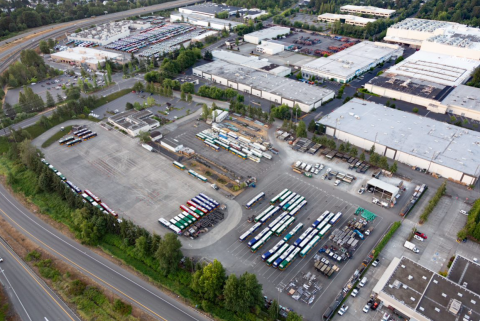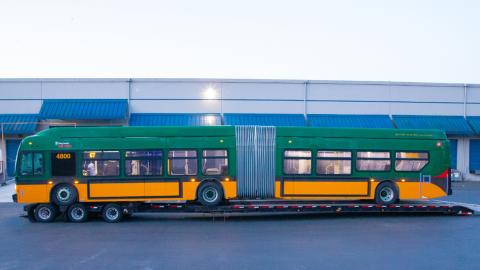Located in the U.S. state of Washington and including Seattle and the surrounding area, King County Metro (Metro) leads the transit industry in early adoption of a battery electric bus (BEB) fleet. These buses produce no exhaust and are quieter than conventional buses. Metro has committed to converting just under 2000 buses to a 100% zero-emissions fleet powered by renewable energy by 2040.
The Jacobs team is excited to be managing and designing what is anticipated to be the largest BEB facilities in the U.S. The new $400 million South Annex Bus Base involves design and construction support of operations and maintenance facilities to support 250 BEBs at full capacity.
In January 2020, Metro announced that it had agreed to purchase 40 BEBs from New Flyer of America, Inc. — to be delivered in 2021 — with plans to purchase 80 more at a total estimated cost of $130 million. This fleet order is Metro’s first big step to respond to the climate crisis, and aligns with the county’s 2020 Strategic Climate Action Plan.
-

Aerial view of King County site for the South Annex Base development along with South Base in the foreground.
-

King County Metro's battery electric bus.
Green infrastructure is a growing trend
This project is the first of many to support this ambitious undertaking. The campus will incorporate best practices and technologies supporting efficient and environmentally responsible operations and showcase King County’s commitment to sustainability. This means requiring U.S. Green Building Council Leadership in Energy and Environmental Design (LEED) Platinum certification and potentially International Living Future Institute Living Building Challenge or Zero Energy certification. The campus will facilitate emerging technologies in battery-based vehicles and vehicle charging infrastructure.
Anchored by a locally-based project team, Jacobs also reached out to engage our transit facility teams in Denver and Boston to help develop a solution that not only showcases state-of-the-art technology innovation but supports our client’s stated commitment to achieving significant advancements in equity and social justice (ESJ).
Equity and social justice will be integral to project success
It’s always fantastic for Jacobs to be able to work with clients to help advance their sustainability and ESJ goals, so we’re excited to incorporate ESJ into this green infrastructure project. A key tool is our alternative analysis approach that integrates economic evaluation, ESJ, and sustainability to develop project goals, objectives and a prioritization framework. So whether we’re conducting equity analyses, integrating major site elements, or measuring capital investment, they will all be viewed through sustainability and ESJ lenses, and incorporate the voice of community stakeholders. Our UK-based Simetrica-Jacobs team has developed a total equity approach called TotalValueX™, which is setting the bar globally as a best-practice framework to quantify and evaluate economic and social value.
In August 2020, Jacobs, in collaboration with Simetrica-Jacobs, released a new thought leadership paper on the role of infrastructure investments in helping to address critical societal issues, asking the question: What if infrastructure could be planned, delivered, built and operated to generate enduring social value at scale to help overcome some of the most entrenched social issues in our communities?
The future of transit
As we transition to a new and sustainable urban approach, cities and communities are adopting a green economic-centric model as part of the transformation. Effective, green-based transit will be critical to developing our cities of the future. Metro and King County are already ahead of the curve with their green fleet initiative, and we’re pleased to be part of it.












































